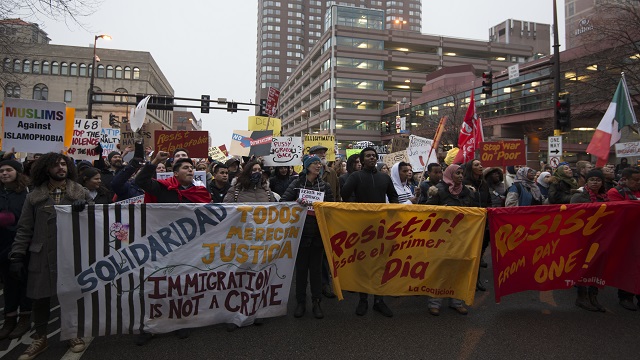
Truthout is a vital news source and a living history of political struggle. If you think our work is valuable, support us with a donation of any size.
The inauguration of Donald Trump as the 45th president of the United States took place amid a haze of pepper spray and the booming of stun grenades yesterday as Washington, DC descended into a day-long period of civil unrest. Today, hundreds of thousands are taking part in the Women’s March, a grassroots mobilization that has named ending violence, reproductive rights, LGBTQIA rights, workers’ rights, civil rights, disability rights, immigrant rights and environmental justice as its unity principles.
Friday’s actions sent the unmistakable signal to the country and to the world that people in the United States see Trump as a serious — if not entirely unique — threat that demands increased levels of confrontation.
“We were setting the tone of resistance for the coming years,” Lacy MacAuley, a member of DisruptJ20, one of the collectives behind Friday’s protests, told me. “No matter what happens with Trump, there will still be others who want to carry forward the agenda Trump is pursuing.”
MacAuley stressed the goal of opposing not only Trump, but also larger systems of oppression that predate Trump. “I think the need right now is urgent,” she says.
One of these ongoing and urgent struggles is the fight to block the Dakota Access Pipeline at Standing Rock. Tara Houska, a member of the Native-led environmental group Honor the Earth, has spent months at Standing Rock, and plans to go back immediately after the inauguration demonstrations are over. She fully expects Trump to push forward with the pipeline, which the Obama administration halted (for the time being, at least) after months of protests. “Trump said that on day five of his presidency he will go forward with it,” Houska said. “He’s going to make it a priority.” She says that the best way to fight back against the new administration, in addition to keeping the camp’s presence strong, is to push for local laws and ordinances to protect the drinking water that the pipeline would put at risk.
Jade Begay, of the Indigenous Environmental Network, has also been at Standing Rock, and will go back shortly. He told me the group is anticipating that Trump may roll back protections on multiple fronts. “There’s a possibility he’ll take executive action to move forward with the Keystone pipeline,” in addition to whatever he does with the Dakota project. “We have to continue to take the momentum to other frontline fights,” Begay said.
As organizers shared their thoughts with me over the course of Friday, a clear theme emerged: Although everyone acknowledged that Trump’s administration will bring new and heightened risks for marginalized communities, many organizers are trying to think years into the future, and not simply react to whatever is in the headlines on a given day.
Whitney Shepard, of Black Youth Project 100, told me her group’s goal was “to build long-term power to stand up to systemic oppression.” Part of their work has been to craft the Agenda to Build Black Futures, which calls for divestment from policing and incarceration, and investment in communities of color. Her group was also involved in the collaboration that produced the policy demands of the Movement for Black Lives.
Sapna Pandya, the executive director of Many Languages One Voice, an advocacy group for people with limited English-language skills, said a longtime focus of her group has been on union organizing and protecting immigrants in workplaces and at school, and the group is striving to anticipate changing conditions under the Trump administration.
“One thing that’s new for us is we’re working to ensure police aren’t acting as an immigration force,” Pandya told me. The Fraternal Order of Police has called on Trump to expand 278(g), a program that allows local cops to become de facto ICE agents. “It’s not just police, either — it’s also jails, corrections officers,” Pandya said.
There was an unmistakable fear that permeated nearly every conversation throughout the day, but there was also a clarity that comes when a common enemy has been clearly identified. The activists in Washington, DC this weekend are laying the groundwork for a level of sustained, multifaceted-but-intertwined civil disobedience that the country hasn’t seen in decades, building upon the last five years’ massive resurgence of social movements.
MacAuley, the DisruptJ20 organizer, made one promise. “As long as they’re coming for us, we are going to resist,” she said. “It’s what we have to do.”
A terrifying moment. We appeal for your support.
In the last weeks, we have witnessed an authoritarian assault on communities in Minnesota and across the nation.
The need for truthful, grassroots reporting is urgent at this cataclysmic historical moment. Yet, Trump-aligned billionaires and other allies have taken over many legacy media outlets — the culmination of a decades-long campaign to place control of the narrative into the hands of the political right.
We refuse to let Trump’s blatant propaganda machine go unchecked. Untethered to corporate ownership or advertisers, Truthout remains fearless in our reporting and our determination to use journalism as a tool for justice.
But we need your help just to fund our basic expenses. Over 80 percent of Truthout’s funding comes from small individual donations from our community of readers, and over a third of our total budget is supported by recurring monthly donors.
Truthout has launched a fundraiser, and we have a goal to add 182 new monthly donors in the next 24 hours. Whether you can make a small monthly donation or a larger one-time gift, Truthout only works with your support.